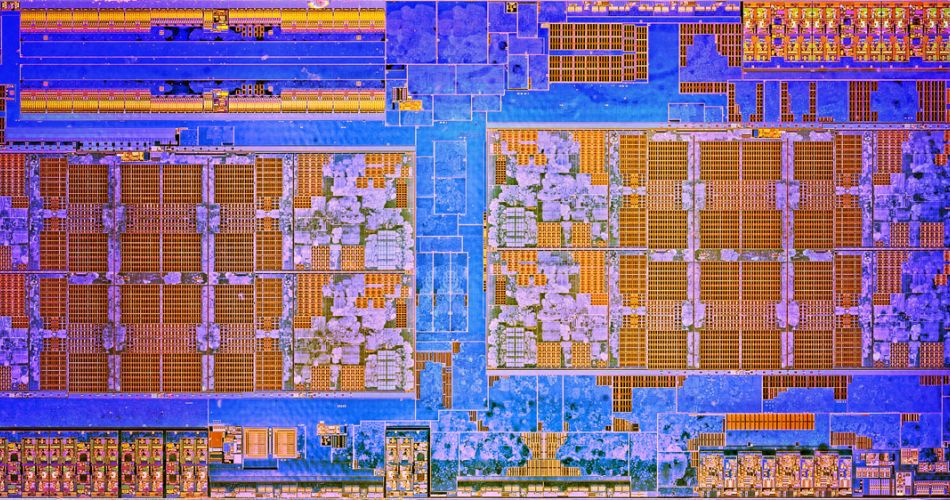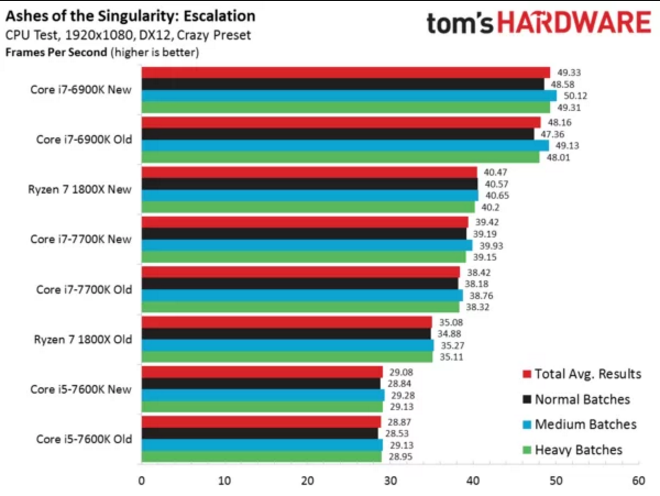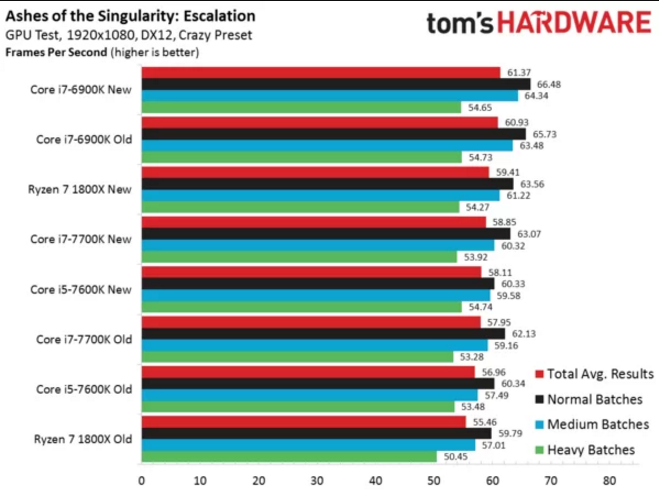AMD Ryzen’s First Game Optimization: ‘Ashes Of The Singularity: Escalation,’ Tested

Stardock and Oxide Games gave us access to a beta build of Ashes of the Singularity: Escalation ahead of its official launch. The update is our first example of a game optimized for AMD’s Ryzen CPUs, which should improve their performance.
Ryzen chips proved to be impressive in heavily threaded workloads, but surprisingly, they suffer from lower frame rates than competing Intel processors in many popular games (for more on this, check out Ryzen versus Core i7 In 11 Popular Games). Ryzen is competitive in some titles. But in Ashes of the Singularity and Rise of the Tomb Raider, for example, they trailed by quite a bit.
AMD confirmed our findings and promised that future updates from game developers should address them. The company sent us notification of the new Ashes update with little time for in-depth testing, but we used our existing platforms to crank out some quick benchmarks.
We’ve been using the original Ashes of the Singularity for our test suite, so this is our first look at Escalation. We are using the same platforms found in our AMD Ryzen 7 1700X review. We tested with stock configurations due to time limitations, but you can expect us to circle back with overclocked performance data soon. These first measurements are collected under DX12, but we also have plans to test with DX11.
First, a word from AMD on the performance gains we should expect:
In testing with a Ryzen 7 1800X paired with DDR4-2933 memory at 1920×1080 resolution and “High Preset” image quality setting, the updated game and its in-game benchmark show a minimum increase of 26 percent in “Average FPS Large Batches,” to a maximum uplift of 33 percent in “Average FPS Normal Batches,” and 31 percent in “Average FPS All Batches” compared to testing with the previous version of Ashes. Although Ryzen 1800X will still be a bit behind the 7700K and 6900K in testing, after a fairly compact optimization effort we now see much closer FPS.
AMD tested with the High preset, but we’re using the Crazy setting since it matches our previous efforts with the original version of the game. Installing the patch took only a few seconds to download and install, implying that the optimizations are merely tweaks to the existing code.

We tested both AMD and Intel processors before and after applying the patch, recording an impressive increase in CPU performance at 1920×1080. The Ryzen 7 1800X trailed Intel’s Core i7-7700K before the update, but swapped positions after we activated the new code. The 1800X notched a 16.36% increase, which falls short of AMD’s projections, but again, we’re using a different preset as AMD.
The 1800X also provided smoother gameplay after the update, as demonstrated in the frame time variance and unevenness results. The Core i7-6900K leads in convincing fashion, and it also appears to benefit from the update with a comparatively small 2.5% speed-up.

We shifted gears to the GPU test, which reveals little post-update variation for the Intel line-up. The 1800X enjoys a 7% performance boost from the update and jumps up several positions.
Our preliminary test results reveal a solid performance gain for the Ryzen 7 1800X after the Ashes of the Singularity: Escalation update. We’re digging deeper into CPU utilization metrics to quantify the nature of the performance increase, which could stem from several factors, including spawning more threads or better cache utilization. We will follow up as we learn more about the update.
AMD’s second update is in the books (DOTA 2 also received an update), and Creative Assembly has also come forward and stated its intentions to update its game engine. However, three developers hardly account for an entire industry that stands to benefit from Ryzen-specific optimizations, and only time will tell how well the ecosystem adapts to the new Zen architecture. Much of the success will likely hinge on how much market share AMD gains, as developers have far more incentive to optimize for widely-used platforms. Older games may never receive patches, and the fact that Stardock (Oxide) has updated only its latest product is telling. However, the company hasn’t indicated if we can expect an update for the original Ashes of the Singularity in the future, so it remains a possibility.
In either case, the update is a welcome one for Ryzen users, as it might be a sign of more to come.